She likes characters who do ‘terrible things.’ And she’s found an actor ready to do them
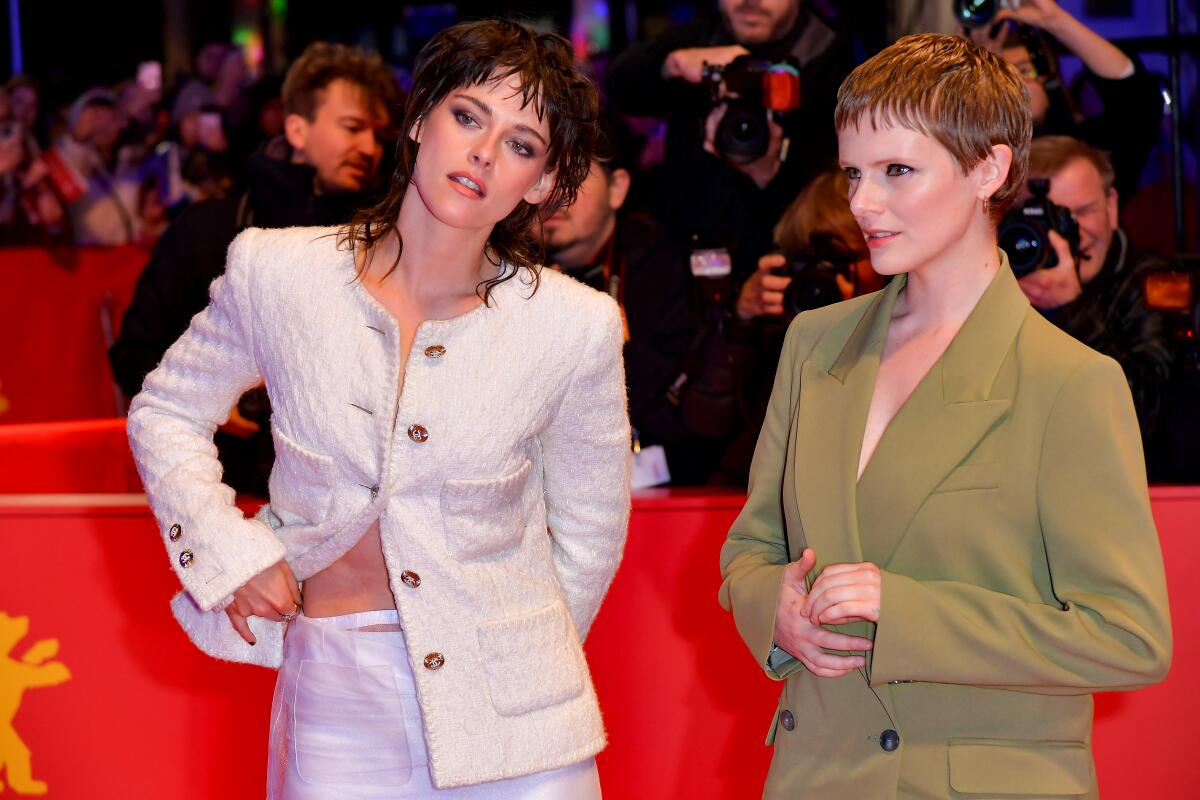
Regardless of one’s orientation, “Love Lies Bleeding” will undoubtedly be one of the sexiest films of the year, full of longing looks and explicit encounters. But it is also much more: a gripping crime thriller, a stylish dark comedy and a film overflowing with a bold, ambitious energy that makes anything seem possible within its world.
From the moment Jackie (Katy O’Brian) walks into the rundown gym managed by Lou (Kristen Stewart), the two have an immediate connection. Jackie dreams of being a championship bodybuilder, while Lou is looking for a way out of town to get away from her controlling father, Lou Sr. (Ed Harris), a local crime boss. Their mutual attraction pushes them to do things they would have previously thought unimaginable.
Directed by Rose Glass from a screenplay by Glass and Weronika Tofilska, the film continues a subjective magical realism explored by Glass in her first feature, 2019’s “Saint Maud.” The story of a young nurse overtaken by scary religious fervor, “Saint Maud” saw its release delayed by the pandemic, only to gain a critical groundswell and become a fan favorite.
London-born and based, Glass, 34, was recently in Los Angeles to promote “Love Lies Bleeding,” which premiered earlier this year at the Sundance Film Festival. The movie opens in select theaters on Friday and nationwide March 15.
Be warned, there are some light spoilers ahead for some of the film’s more fantastical turns.
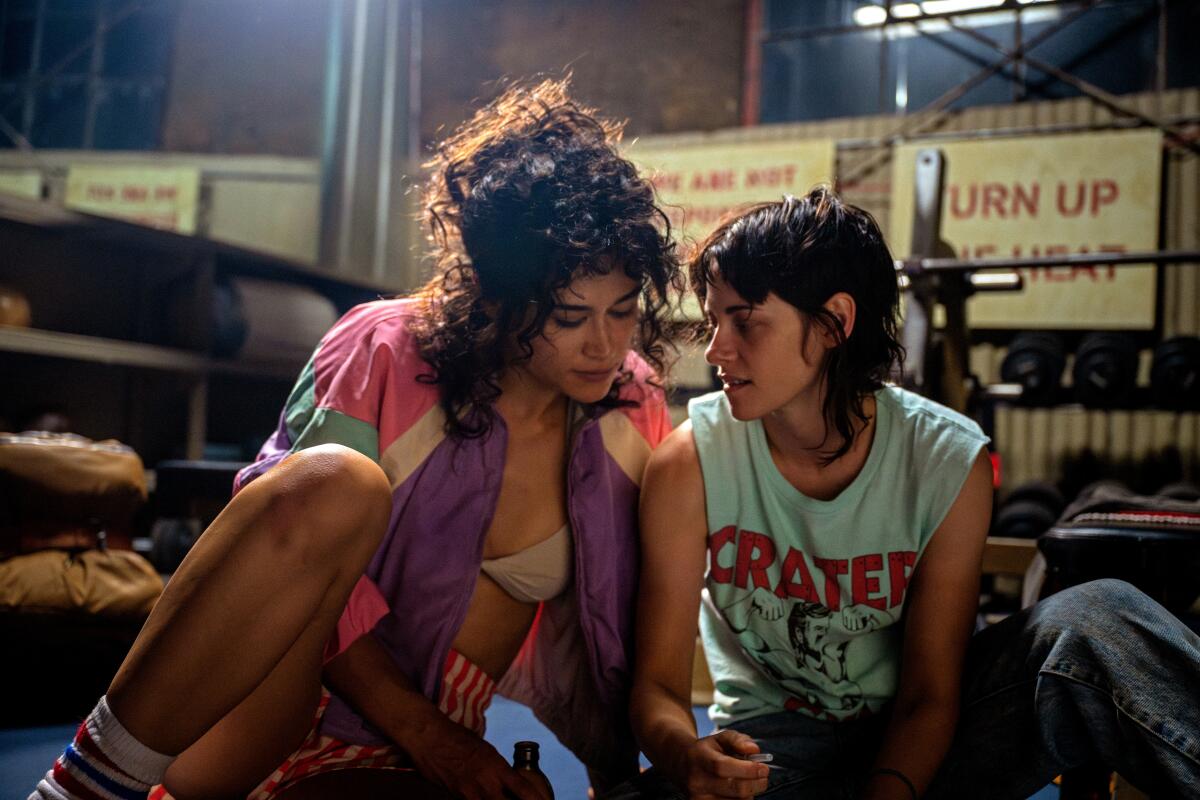
I’m trying to consider “Saint Maud” and “Love Lies Bleeding” together. What inspires your exploration of identity as well as desire?
I think as someone writing and making films, I feel in a privileged position to be able to explore quite intimate personal ideas within myself. But through the lens of completely fictional people, you can hide behind the fiction of it, but I guess a lot of it comes from somewhere inside. I don’t know what that says about me, given the amount of blood and murder and stuff that happens in them.
In an interview you did around the time of “Saint Maud,” you were asked what you were working on next and you roughly described what became “Love Lies Bleeding,” saying, “I’m interested in bodies and brains.” Can you elaborate a bit?
I think it’s to do with just the weirdness of human existence and consciousness. And the fact that we all share the same physical space and physical world, but we all experience reality so entirely individually and subjectively just from our own little brain bubbles. And something about the disconnect between how far-reaching our thoughts and emotions and ideas can be within our heads, and yet we’re confined to these weird kind of fleshy things that go wrong and need maintaining in a messy and inelegant way. And can also be all those other sensual, wonderful things as well. I don’t know. Humans are weird.
“Love Lies Bleeding” combines many genres. It’s a neo-noir crime story, a lovers-on-the-run drama that’s also darkly funny. Can you untangle all of that? Where is that combination coming from?
It’s hard to unpick. I think it is just what comes out naturally and instinctually. And that’s for good or bad. The sort of films that I feel capable of making, I don’t think I’d be particularly good at trying to shoehorn into something more sensible. I’m sort of figuring it all out as well. It’s only a second feature film. Life is strange and varied and we all contain lots of contradictory things within us. In terrible times there’s humor and darkness, and sometimes you can still really like characters that are doing terrible things. The contradictions are what I find interesting.
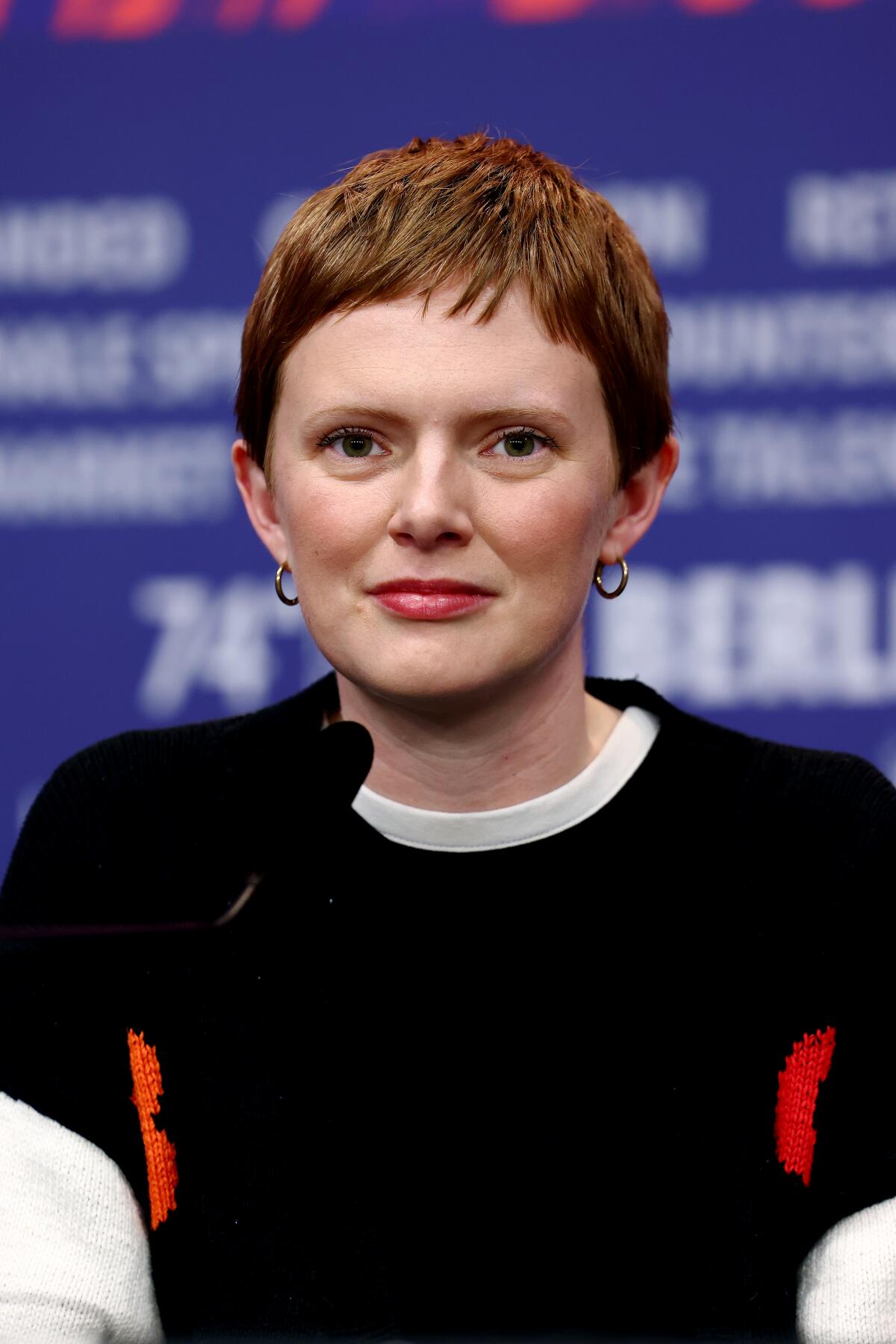
At the press conference for the film at the Berlin Film Festival, you and Kristen Stewart spoke a little bit about how you had had her watch “Showgirls.” What is it you drew from that movie specifically?
It was just to give the actors a sense of the flavor of the world that we’d be in, just so that they knew they had permission to take some big swings, and tonally to calibrate their performances a bit. And “Showgirls,” it’s obviously achieved such cult-like status. It’s not one of those ones I watch over and over or anything, but I’m a big Paul Verhoeven fan and I think I also suggested they watch “Starship Troopers.” They’ve both got this delicious kind of satire in them, which may be a result of non-Americans making films about America.
And just with “Showgirls” specifically, it’s also the momentum of that film and the energy of it. Regardless of whatever else people like or dislike about it, just the sort of fizzing energy beneath the skin of everything. The camera’s constantly moving, the momentum of it is just extraordinary. It’s so committed and earnest in some way, but so kind of camp as well. And camp’s a hard thing to quantify or do super-consciously, but I think I wanted to make sure they saw that.
Although I think Kristen only watched it like halfway through the shoot. She came out of her trailer — like we’d already shot half of it and she was like, “Oh, ah, OK.” Because I kept telling her to go bigger and bigger with different takes and I think she was a bit resistant. And then she saw that and I think hopefully it gave her permission to take some big swings. What a movie.
One of the things that’s so extraordinary about “Love Lies Bleeding” is the whole movie has this horny, turned-on energy about it. Is that difficult to both build in the first place but also maintain?
Not really. I mean to be honest, that just was sort of how it came out and a lot of the queerness and horniness was baked into the story. You shoot films so disjointedly in all these little pieces, it’s almost not until you’ve shot all the bits and cut them together that you go: “Oh yes, it is very horny throughout the whole thing.” It’s a love story. It’s people meeting each other and falling in love for the first time and those whirlwind sort of first few weeks. Going into it, I don’t think I was specifically thinking of it as horny, but I definitely knew going into it that I wanted it to feel sweaty and intense.
I’m increasingly aware that “Love Lies Bleeding” feels a bit like weird teenage wish fulfillment — the sort of film that I would’ve really loved to have watched growing up. And part of that is “Showgirls,” I’m pretty sure the first time I saw that, I probably just caught it like halfway through on TV, like one night when I’d snuck downstairs and should have been in bed. This is before there were millions of channels and before sex was so readily available on the internet. It probably just had an impression on me and so there’s things about this film which I feel like would’ve been exciting, and good to have thrown into the mix of horny films you see in those impressionable years.
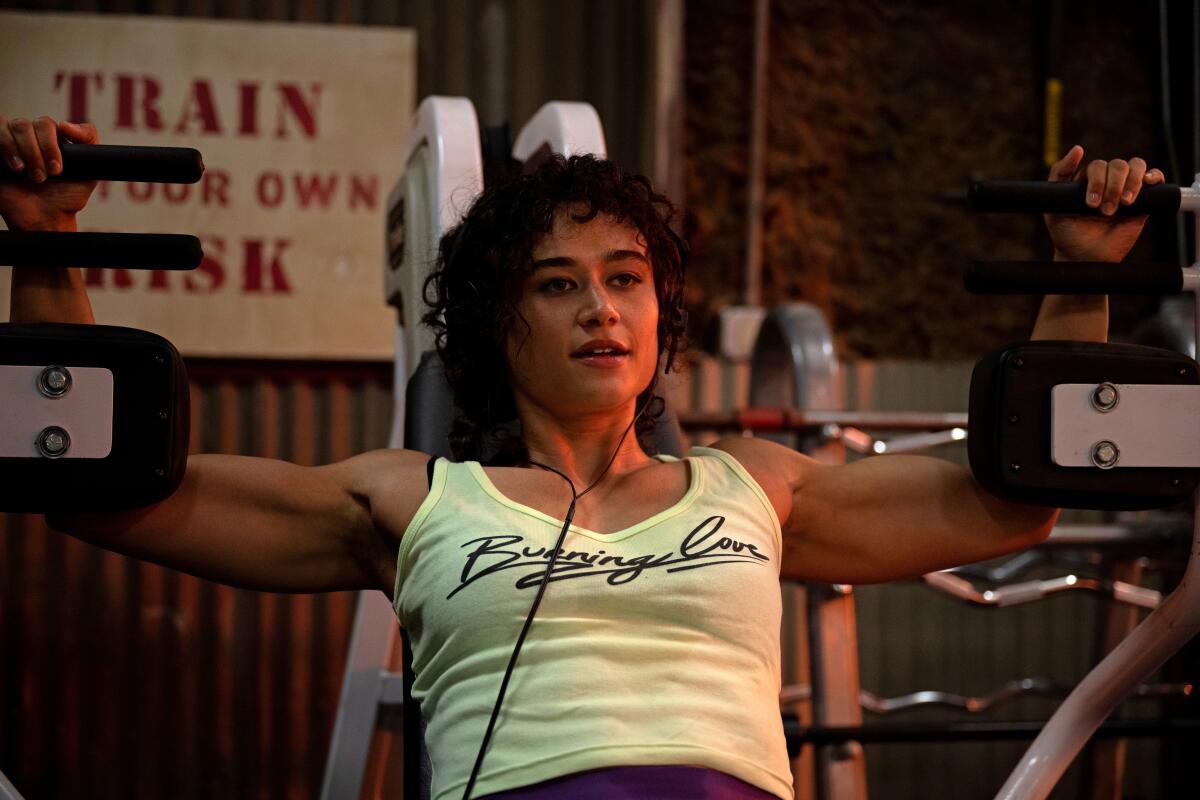
From the first moment that Lou sees Jackie, it is almost as if Jackie is the person that Lou has been waiting for. Some reviews have even suggested that Lou conjures Jackie, that she isn’t real. How do you feel about that?
Somebody came up to me after the film and was like, “Jackie’s not real, is she?” And I was like, “What?” Which I find kind of a fascinating interpretation. I would be lying if I said that that was actively what I was thinking. I do think she’s definitely real. She appears and gives Lou exactly what she needs when she needs it in her life.
It’s not a totally evenly weighted power dynamic between the two of them and maybe is sort of shifting throughout the film, maybe in ways that the characters aren’t aware of. Lou is stuck and emotionally constipated, and needs to act and basically can’t, won’t, whatever. And Jackie is like the id or something that comes in. Lou needs to break herself out of her routine. But one person’s dream comes at the expense of another‘s. If Jackie is Lou’s dream, Jackie’s dream kind of gets derailed by Lou’s love. It’s one of those relationships where there’s something kind of codependent about it.
The biggest leap in the movie is when Jackie briefly grows to 35 feet tall. For you, is that a subjective moment? Are people meant to take that literally?
I think people should take it however they want. I sort of felt like this with “Saint Maud,” I found myself kind of over-explaining everything and I think there’s only so many ways you can interpret it. Far be it from me to tell anybody that their version is wrong. I think it probably takes the fun out of it.
Without spoiling it, the last shot of the film is played through a car window with Jackie in the foreground and Lou going through this great bit of business in the background that goes on for a very long time. Why did you conceive of finishing the movie in that way?
It felt like that was the punchline of everything. It’s trying to go through these moral jigsaws to kind of justify certain things to themselves. In the end, everyone has the potential to do awful things if it gets them what they want. And I think people are quite good at justifying anything to themselves if it gets them what they want and makes them feel good. So I didn’t want to let anybody off the hook. We all turn into our parents eventually. So it just felt like the right thing to do.
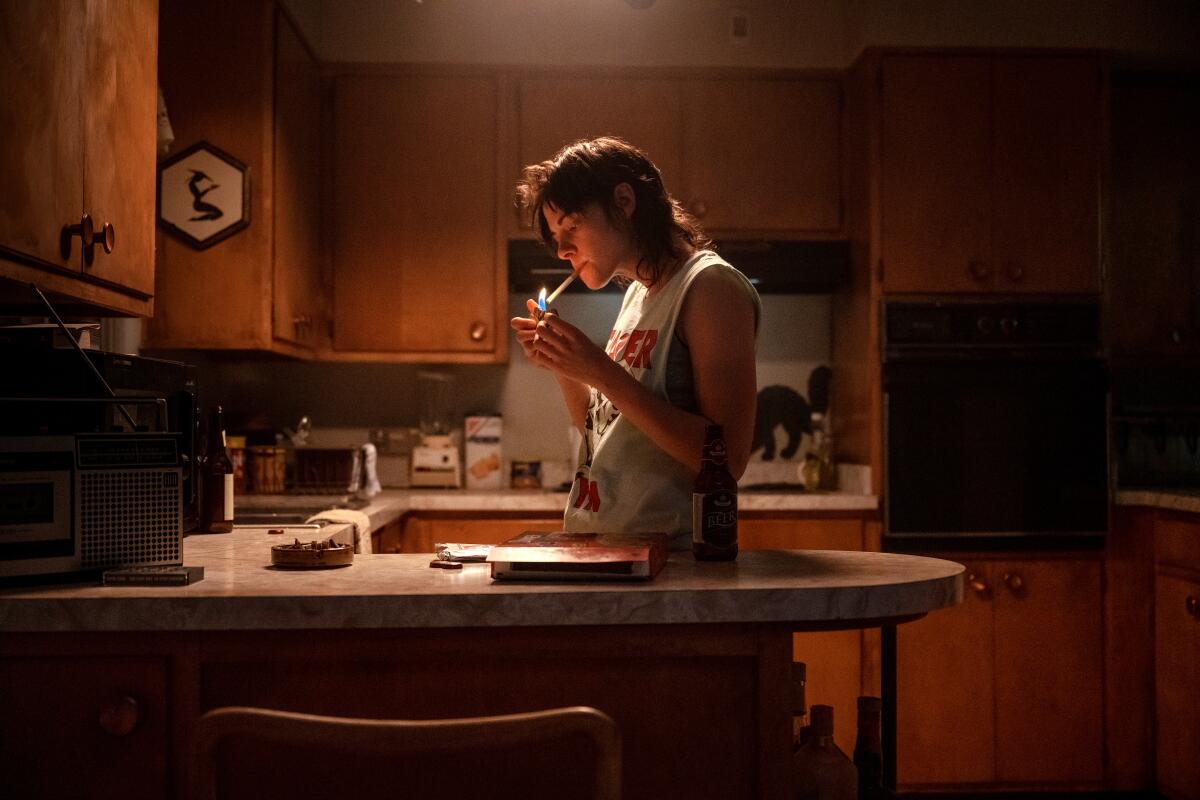
Do you think it works out for those two crazy kids? Do you have a thought about what happens to Jackie and Lou a little further down the road?
Short term? Sure, I think it probably continues being great for a bit and then I’m not sure quite how long-term sustainable whatever they’ve got going on is. I’d be interested to see what happens wherever they stop off next. I kind of figured they go on the road together and Lou becomes Jackie’s cheerleading manager as she goes around doing bodybuilding competitions and it all gets more toxic. But it’ll feel great along the way.
In both of your films there’s a boldness to the storytelling. The movies are willing to go to some pretty outrageous places. Where does the strength and the confidence to do that come from?
I guess I just don’t know any other way of doing it. And I’m incredibly fortunate and privileged to be in this position. So I’m not thinking about it as consciously or analytically as that. It’s just: Cool, I get to make another film. I’m just literally going from: What am I going to find interesting and entertaining? Let’s do that. And I think from having wanted to make films since I was really young and making silly short films and stuff all my life, it’s always been led by enjoying surprising people.
The response to “Saint Maud” was emboldening and frightening and exciting and all of those things all at once. So I feel I’ve just got to ride the moment. And sort of not take it too seriously as well — trying not to be too precious about it and just be led by what you think is entertaining and interesting. And if you think it’s entertaining and interesting, then hopefully other people will too.
More to Read
Only good movies
Get the Indie Focus newsletter, Mark Olsen's weekly guide to the world of cinema.
You may occasionally receive promotional content from the Los Angeles Times.











